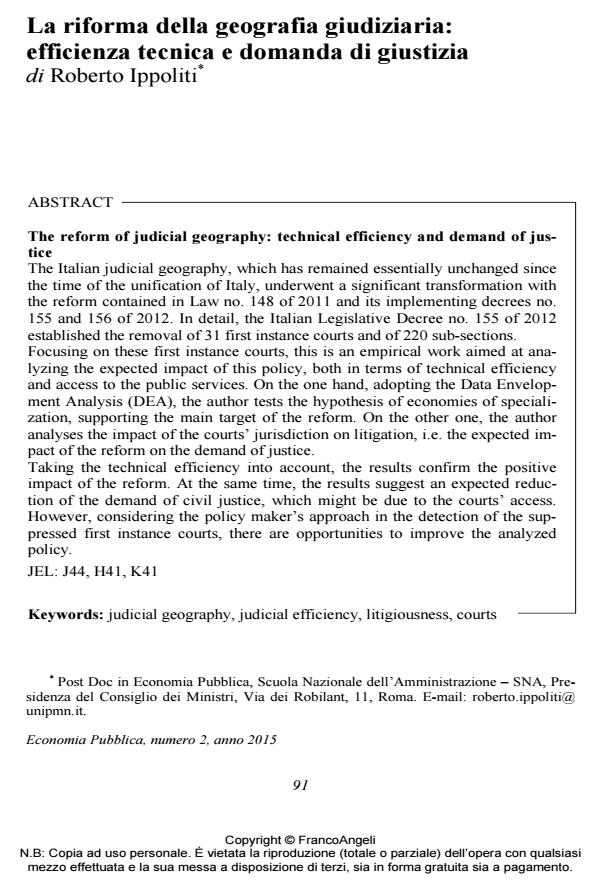The reform of judicial geography: technical efficiency and demand of justice
Journal title ECONOMIA PUBBLICA
Author/s Roberto Ippoliti
Publishing Year 2016 Issue 2015/2
Language Italian Pages 34 P. 91-124 File size 345 KB
DOI 10.3280/EP2015-002003
DOI is like a bar code for intellectual property: to have more infomation
click here
Below, you can see the article first page
If you want to buy this article in PDF format, you can do it, following the instructions to buy download credits

FrancoAngeli is member of Publishers International Linking Association, Inc (PILA), a not-for-profit association which run the CrossRef service enabling links to and from online scholarly content.
The Italian judicial geography, which has remained essentially unchanged since the time of the unification of Italy, underwent a significant transformation with the reform contained in Law no. 148 of 2011 and its implementing decrees no. 155 and 156 of 2012. In detail, the Italian Legislative Decree no. 155 of 2012 established the removal of 31 first instance courts and of 220 sub-sections. Focusing on these first instance courts, this is an empirical work aimed at analyzing the expected impact of this policy, both in terms of technical efficiency and access to the public services. On the one hand, adopting the Data Envelopment Analysis (DEA), the author tests the hypothesis of economies of specialization, supporting the main target of the reform. On the other one, the author analyses the impact of the courts’ jurisdiction on litigation, i.e. the expected impact of the reform on the demand of justice. Taking the technical efficiency into account, the results confirm the positive impact of the reform. At the same time, the results suggest an expected reduction of the demand of civil justice, which might be due to the courts’ access. However, considering the policy maker’s approach in the detection of the suppressed first instance courts, there are opportunities to improve the analyzed policy.
Keywords: Judicial geography, judicial efficiency, litigiousness, courts
Jel codes: J44, H41, K41
- Factors affecting judicial system efficiency: a systematic mapping review with a focus on Italy Monica Giancotti, Giorgia Rotundo, Marianna Mauro, in International Journal of Productivity and Performance Management /2024 pp.2951
DOI: 10.1108/IJPPM-05-2023-0215 - Global Encyclopedia of Public Administration, Public Policy, and Governance Greta Falavigna, Roberto Ippoliti, pp.6742 (ISBN:978-3-030-66251-6)
- L’esperienza Uni4Justice e le prospettive future Le ricerche del team di Ca’ Foscari Michele Zanette, Alessandro Grassi, (ISBN:978-88-6969-766-1)
- Global Encyclopedia of Public Administration, Public Policy, and Governance Greta Falavigna, Roberto Ippoliti, pp.1 (ISBN:978-3-319-31816-5)
- Data envelopment analysis to investigate the Italian legal system and its reform Greta Falavigna, Roberto Ippoliti, in Journal of Public Affairs e2877/2023
DOI: 10.1002/pa.2877
Roberto Ippoliti, La riforma della geografia giudiziaria: efficienza tecnica e domanda di giustizia in "ECONOMIA PUBBLICA " 2/2015, pp 91-124, DOI: 10.3280/EP2015-002003